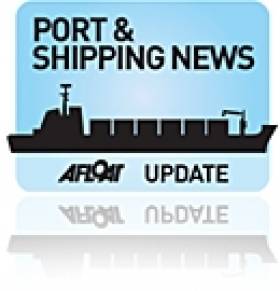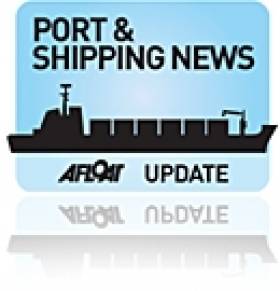Displaying items by tag: Training Ship
The Empire Strikes Back
The 14,620 dwt US-based training-ship Empire State made a return call to the Port of Cork last night for a four-day stay, writes Jehan Ashmore.
At over 172m long the cruiser-sterned vessel with a port of registry of New York, moored at the Cobh Cruise Terminal which was recently visited by another US training ship, State of Maine (click HERE).
The veteran vessel now in her sixth decade of service and is the also the sixth training-ship to carry the name 'Empire State' for the State University of New York (SUNY) Maritime College.
Empire State was laid down as SS Oregon at the Newport News Shipbuilding and Drydock Company, Newport News, Virginia. She was launched in 1961 for the States Steamship Company and delivered a year later for service in the Pacific trades. For further information about the vessel's interim career before she was converted for her current role click HERE.
Despite her conversion she still presents a distinctive profile with the superstructure positioned amidships between the cargo-holds.
Prior to the Empire State's arrival the French cruiseship Le Diamant departed Cobh for an overnight passage to Dublin, where last year the Empire State made a port of call.
The next cruise-caller to Cobh is the 296-passenger Silver Cloud which is scheduled to dock on Monday evening.
- Dublin Port
- Cobh
- Cork Harbour
- port of Cork
- New York
- Silver Cloud
- Cobh Cruise Terminal
- Cruiseships
- Cork Harbour News
- State of Maine
- Port of Cork News
- Training Ship
- Empire State
- Suny Maritime College
- La Diamant
- Newport News and Shipbuilding
- Newport News
- States Steamship Company
- State University of New York
US Training-Ship Heads for Cork
For five-days the US training-ship State of Maine will make Cork Harbour her port of call, when the 16,000 tonnes vessel docks this evening, writes Jehan Ashmore.
The 500-foot long ship is on a 55-day training cruise that started late last month from her homeport of Castine Harbour in Maine. Since then the Maine Maritime Academy's training-ship has visited Norfolk, Virginia before crossing the Atlantic to include calls to Valetta, Malta and the vessel's most recent port of call was Civitavecchia in Italy.
Onboard the former oceanographic vessel that served in the US Navy as the USNS Tanner, there are students, officers and crew. The Maine Maritime Academy purchased the vessel in 1997 and she was converted to accommodate the training needs of the college.
The academy was founded in 1941 and enrolls more than 900 students from 35 states and from several foreign countries. Students in the college are awarded A.S., B.S., and M.S. degrees in 15 fields of study.
State of Maine is to berth at the Cobh Cruise Terminal, the facility which normally caters for cruiseships is to be followed by another training-ship the 17,000 tonnes Empire State on 22 June.

























































